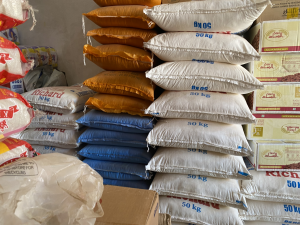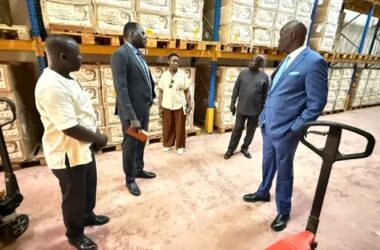By Aweye Teddy Onam
Fluctuating foreign exchange rate, causing the US dollar to hit a record high against the local pound has led to rising unrest among families as commodity prices shoot up in Juba markets.
Mary, ‘not her real name’, a resident of Juba, narrates to No. 1 Citizen Daily Newspaper, how sky-rocketing commodity prices have sparked a brawl between her and her husband.
“The situation is bad according to me as a mother of two and a wife because my husband doesn’t understand a lot of things, and once he gives me money, he thinks it will be enough. So, we are facing these challenges,” she narrated.
According to her, the husband gives her SSP 100,000 for hand-to-mouth for the duration of one month, but it finishes at mid-month due to high food prices in the market.
“A man can give you SSP 100,000 that it is for a month, but it will not even reach the end of the month because things are very expensive right now in the market and imagine 10kg of maize flour is now SSP 13,000, which used to be SSP 10,000 last week, is now affecting us a lot”, she cited.
Mary said the government should consider the poor, saying if inflation continues the way it is, the poor will continue to suffer.
“My message to the government of South Sudan is that they should work on the exchange rate because it is really affecting us and also because people are not the same because the situation everyone is in is not the same,” she urged.
“The government of South Sudan should concentrate on the issue of exchange rates for all of us to survive in this country”, she added.

Another Juba resident, whose name was withheld, said that the prices in every shop keep changing every time they hit the market, with some shooting up drastically.
“The increase in commodities is affecting household relationships between a husband and a wife because today you can buy a commodity at a cheaper price, and then the next day you go to the market, the price increases, which brings confusion in the family,” she testified.
“I urge the government of South Sudan to reduce the dollar rate for the smooth flow of food items in the market because not all citizens earn dollars in the country”, she cried out.
No. 1 Citizen Daily Newspaper yesterday established that in the black market, 100 dollars sells for 110,000 SSP while buying them is for 112,000 SSP.
While the Bank of South Sudan (BoSS) official exchange rates published on their website yesterday put the 100 dollars at SSP 101,500, selling, and 100,800 buying,
In May, the Bank of South Sudan (BoSS) linked multiple external factors to exacerbating inflation in the country.
This comes after the local currency, the South Sudan Pounds (SSP), plummeted to its lowest point of all time against the U.S. dollar in the foreign exchange market.
The drastic decline of the local currency against the US dollar in the foreign exchange market prompted the BoSS’ Monetary Policy Committee to convene a meeting on Friday to look into the issue.
In a statement, the Central Bank said the interest rate hike has made it impossible for them to borrow, adding that the war in Ukraine has also disrupted global supply chains and increased food and energy prices.
BoSS also stated that, due to the above factors, South Sudan’s already fragile economy is a mess.
The bank also cited that the economic crisis is caused by geopolitical tensions in Europe and Sudan.




